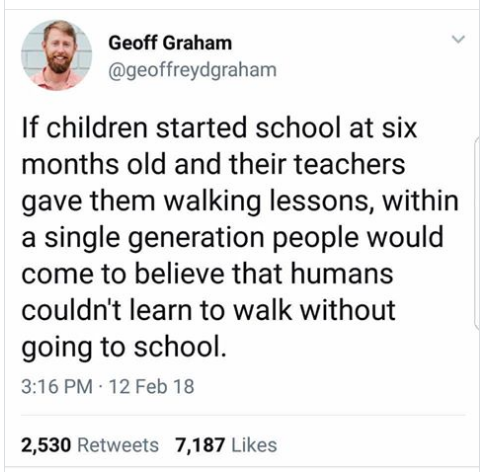The Poor Scholar’s Soliloquy by Stephen Corey has been brought to our attention by Wayne Jennings, lifelong student of education and change agent. He included the Soliloquy in his book School Transformation (2018). Wayne is currently involved with a coalition of groups including AERO and #JustAskUs that are coming together to help ensure we emerge from the pandemic with school systems that do right by children and youth, and which create a better world.
Evidence has been mounting for decades that traditional education practices are failing us. Over the years, a clear choice has emerged and it is time to put it on an equal footing with traditional education. It is known as the Self-Directed Education model – SDE, not to be confused with progressive education. Peter Gray defines the differences in one of his Psychology Today blog items.
In his book Drive, which is about cultivating the benefits of autonomy, Daniel Pink states, “This era doesn’t call for better management. It calls for a renaissance of self-direction,” but he warns that you cannot take people who have been highly controlled and plunk them into environments of undiluted autonomy. They will suffer, and this is what we are seeing with the current school closures. People are suffering because learning has been meticulously managed by ministries of education on down and with the management abruptly ended, masses of people are at a loss for what to do with themselves. The poor soles have been incapacity in the way alluded to by Geoff Graham in his tweet copied below. Instead of providing students with the skills and attitudes required for independent, lifelong learning, schools have cultivated a dependency that has been termed learned helplessness.

The study of paradigm shifts tells us that not everybody sees the benefits of a new paradigm at the same time, and while they may not completely understand the full capacity of a new one, they know that the old one is not working and they would like to try something new in a way that is not too risky. This is exactly what the program promoted by OPERI is designed to do. It gives students the opportunity to experience a degree of self-directed learning for a semester with plenty of scaffolding in place to prevent them from feeling lost. If they find that the SDE model doesn’t suit them, they can go back to the old way at the end of the semester.
There are masses of people who want an option other than the one provided by public education and it is time that they be given an option that aligns with human rights, democratic principles, the latest brain research, and employers demand that school graduates have the skills they required to be creative, critical thinkers who know how to communicate and collaborate. If we are to learn from history, then rather than continuing to allow the dominant education paradigm to keep subverting SDE, we will put it on an equal footing and unleash innovative educators to conduct its normal science. Students need to be given a distinct option upon their return to school. This is done by creating schools-within-schools without coercion. The students and teachers, well supported by their superiors, need to want to be pioneers otherwise they could be party to setting back the development of something we all need.
No matter how comfortable it might be to return to the ways, let us not squander the lessons of this moment in history by failing to think ourselves out of our rut. That is the message in Alan King’s timeless cartoon.
